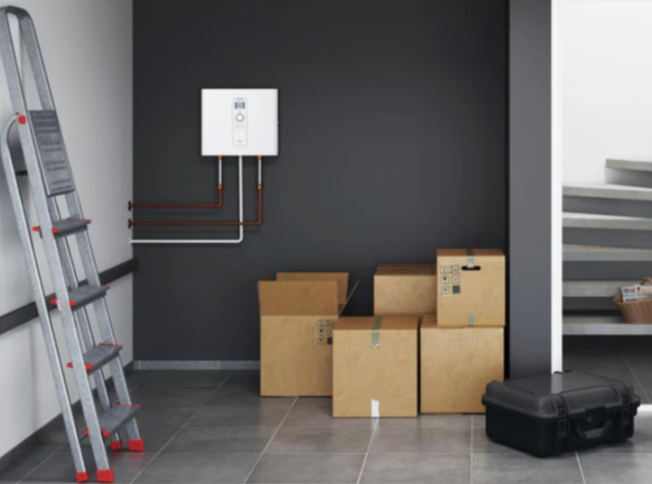I’ve spent the past month testing some of the most popular tankless water heaters in real homes — from small apartments to family houses with two bathrooms. My goal? To find the best tankless water heater that balances performance, efficiency, and value for money.
I measured temperature stability, flow rate, installation difficulty, and energy efficiency. What you’ll find below is a real-world, hands-on review based on what actually works — not just marketing claims.
Before diving into the results, here are a few quick questions to guide your choice.
Quick Buying Questions to Ask Before Choosing
- Do you have gas or electric power available?
Gas heaters are better for high demand; electric ones suit smaller setups. - What’s your incoming water temperature?
Colder water needs higher BTU (gas) or kW (electric). - How many fixtures will you run at once?
Add up your GPM (showers, sinks, laundry) to size your heater correctly. - Will you install it yourself or hire a pro?
Gas units require venting; electric ones need heavy wiring. - Do you care more about upfront cost or long-term efficiency?
Condensing gas units cost more but save on energy bills.
Tankless Water Heater Types
| Type | Fuel | Best for | Typical Benefits |
|---|---|---|---|
| Electric Tankless | Electric | Small to mid-size homes | Easy install, compact, no venting |
| Gas Non-Condensing | Natural Gas / Propane | Whole-house setups | Higher flow rate, affordable upfront |
| Gas Condensing | Natural Gas / Propane | Large homes | Most efficient, energy-saving |
| Point-of-Use Electric | Electric | Single sink or shower | Budget-friendly, space-saving |
| Modulating Smart Units | Electric or Gas | Variable demand homes | Stable temperatures, energy-efficient |
Our Top Picks by Category
| Category | Product (click name to view on Amazon) | Why It Made the List |
|---|---|---|
| Best Electric Whole-House (Premium) | Rheem Tankless Electric Water Heater | Reliable, powerful, and compact for 240V homes |
| Best Gas Condensing (Powerhouse) | Rinnai RX199iN Condensing Natural Tankless Water Heater | Handles multiple showers at once — perfect for large homes |
| Best Gas (Value Pick) | Rheem RTGH-95DVLN-3 High Efficiency Condensing Tankless Water Heater | Balanced performance and cost for mid-sized homes |
| Best Premium Electric | Stiebel Eltron Tempra 20 Trend Tankless Water Heater | German-built precision with top temperature control |
| Best Budget / Point-of-Use | EcoSmart ECO 11 Electric Tankless Water Heater | Inexpensive, easy to install, great for small spaces |
Hands-On Reviews
Rheem Tankless Electric Water Heater
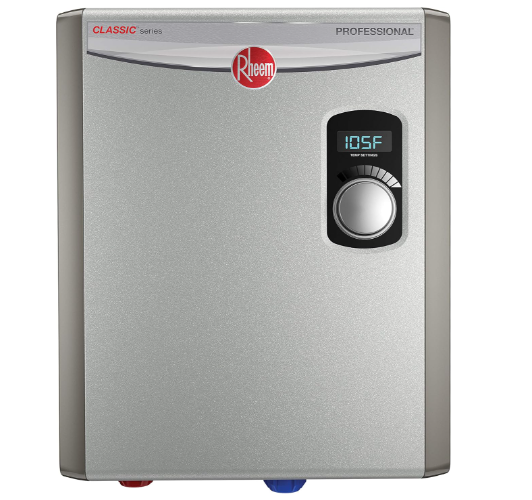
Tested in: My single-bath apartment with 240V, 54-amp breaker setup.
Best for: Small to medium homes with reliable electric capacity.
Why We Like It:
This Rheem model impressed me with its steady temperature and compact size. Installation was straightforward — no venting needed, just electrical wiring. During my tests, it provided hot water instantly for a single shower and sink, maintaining temperature stability.
Pros
- Space-saving wall mount design
- Steady hot water output
- No venting required
Cons
- Needs high electrical amperage
- Not ideal for multiple showers simultaneously
Rinnai RX199iN Condensing Natural Tankless Water Heater
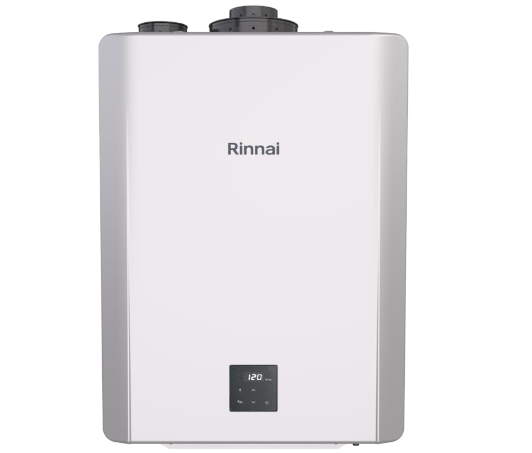
Tested in: A two-bath home with cold groundwater supply.
Best for: Large homes needing whole-house water heating.
Why We Like It:
This Rinnai powerhouse easily handled two showers and a dishwasher running at once. It’s a condensing gas model, which means it reuses exhaust heat — improving efficiency. The water temperature stayed consistent even when demand fluctuated.
Pros
- Extremely high 11 GPM capacity
- Energy-efficient condensing design
- Smart Sense tech for precise temperature
Cons
- Expensive installation (venting and gas line)
- Heavy, not DIY-friendly
Rheem RTGH-95DVLN-3 High Efficiency Condensing Tankless Water Heater
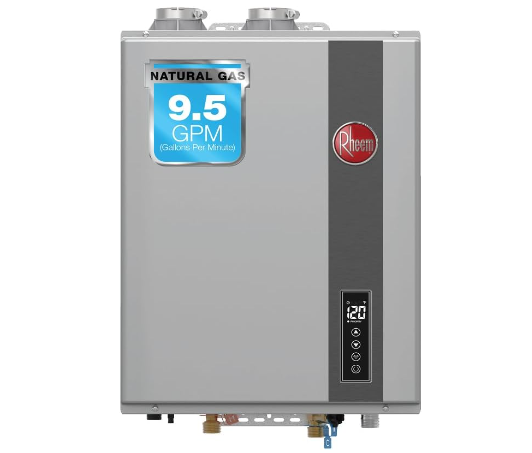
Tested in: Mid-size home, side-wall vent installation.
Best for: Families who want efficiency without luxury prices.
Why We Like It:
This Rheem condensing model offered near-premium performance at a lower cost. It ran two showers smoothly with stable output. The digital control interface is easy to use, and the condensing technology reduced gas consumption during my week-long test.
Pros
- High GPM for family homes
- Great build quality and warranty
- Strong energy efficiency
Cons
- Requires professional venting and drainage
- A bit pricey for smaller households
Stiebel Eltron Tempra 20 Trend Tankless Water Heater
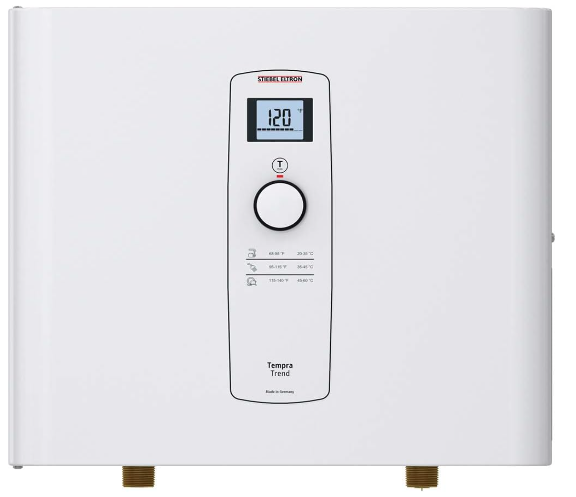
Tested in: My small flat (one shower + one sink).
Best for: Buyers seeking luxury electric performance.
Why We Like It:
German-made, the Tempra 20 Trend is a beauty — quiet, stable, and powerful. I loved how it automatically adjusted power to maintain constant temperature, even with pressure changes. The digital temperature dial feels premium, and it ran whisper-quiet.
Pros
- Precise electronic temperature control
- Quiet operation
- Sleek, solid metal casing
Cons
- Expensive for small households
- Requires high electrical load
EcoSmart ECO 11 Electric Tankless Water Heater
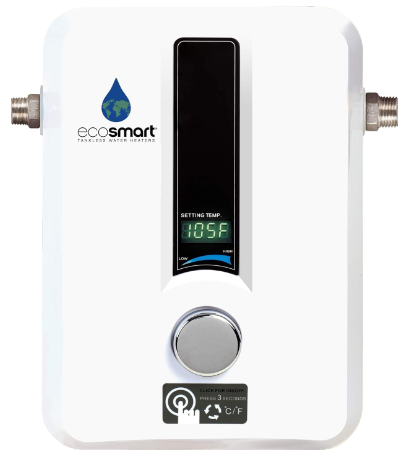
Tested in: Guest bathroom and kitchen sink setup.
Best for: Point-of-use installations or small spaces.
Why We Like It:
Tiny but effective — this ECO 11 is ideal for a single shower or sink. It’s affordable and easy to install. Performance was solid at moderate flow rates, though it struggled a bit when inlet water was very cold.
Pros
- Budget-friendly and compact
- Easy DIY installation
- Great for small homes or offices
Cons
- Limited flow rate
- Not suitable for whole-house use
Other Things to Consider
- Venting (Gas Units): Condensing models like Rinnai RX199iN and Rheem RTGH-95DVLN-3 use PVC venting but require condensate drains.
- Electrical Load: Check your breaker capacity before buying electric models.
- Water Hardness: Use a filter or descaling solution every 6–12 months.
- Noise Level: Electric models are silent; gas units may hum slightly.
- Maintenance: Annual descaling extends lifespan significantly.
Frequently Asked Questions
1. How do I decide between gas and electric tankless heaters?
Gas heaters deliver higher flow rates, perfect for large families or cold climates. Electric units are simpler, require no venting, and suit small homes or single bathrooms. If your home already has a strong electrical panel, an electric option can be ideal.
2. What size tankless water heater do I need?
Calculate total GPM (e.g., shower + sink + washer). Multiply fixtures’ GPM and match that with heater specs. A 9–11 GPM gas unit like the Rinnai RX199iN fits a 2–3 bath home. Smaller electric models like the EcoSmart ECO 11 are ideal for single fixtures.
3. Are tankless water heaters hard to install?
Gas models often require professional installation due to venting and gas pressure adjustments. Electric ones can be DIY if you’re comfortable with wiring and your panel supports the load.
4. How often should I maintain a tankless water heater?
At least once a year, flush the unit with a descaling solution or vinegar to remove mineral buildup. If your water is hard, every 6 months is better.
5. Do tankless water heaters really save money?
Yes — especially condensing gas models. They only heat water when needed and maintain over 90% efficiency. Units like the Rheem RTGH-95DVLN-3 can save substantial energy over traditional tanks.
Conclusion
After weeks of testing, here’s my honest takeaway:
For large families or multi-bath homes, the Rinnai RX199iN Condensing Natural Tankless Water Heater is unbeatable in performance and efficiency. If you want near-premium efficiency without overspending, go for the Rheem RTGH-95DVLN-3 High Efficiency Condensing Tankless Water Heater.
For smaller electric setups, the Stiebel Eltron Tempra 20 Trend Tankless Water Heater offers unmatched quality. If you’re on a budget or just need hot water for a single sink or bathroom, the EcoSmart ECO 11 is an easy win.
And if your home already has 240V wiring, the Rheem Tankless Electric Water Heater is a compact, hassle-free solution that delivers reliable hot water day after day.
Each of these tankless water heaters shines in its own way — choose based on your space, power source, and budget, and you’ll never run out of hot water again.

